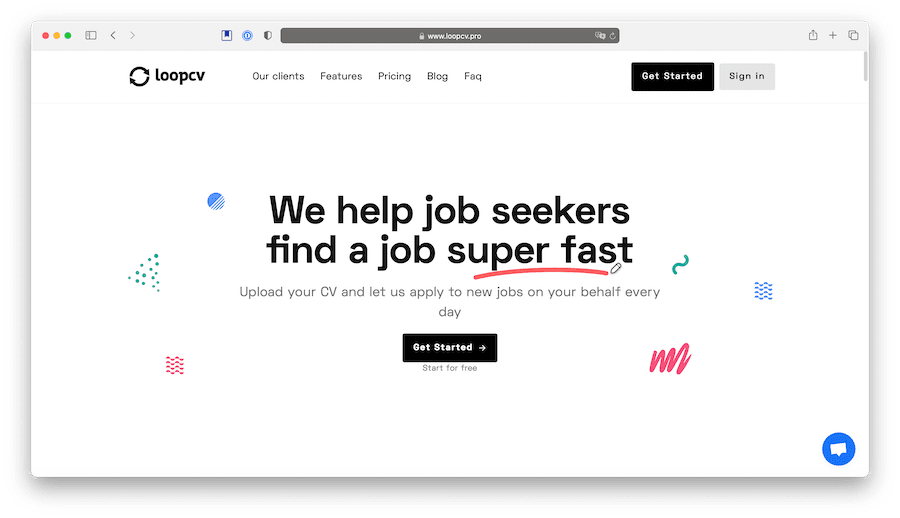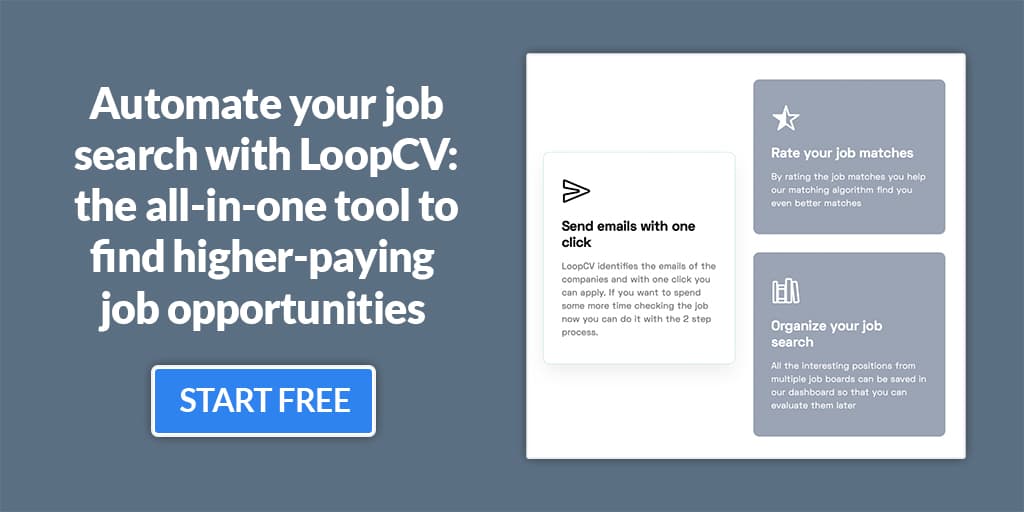Hiring Manager vs Recruiter: Who Makes The Final Decision?
Your chances of getting hired always come down to someone making the final decision, but who is that person: the recruiter or the hiring manager?
And what is their decision-making power in the hiring process?
» FREE TRIAL: Get Started with LoopCV & Send Out 100s of Highly-Targeted Job Applications in <10 Minutes
Decision-making is a complex process. Several parties have a say, and the recruiter works with the hiring manager to end up in the hiring decision.
Every organization does things differently, but the "standard" process is: the recruiter manages operations whereas the hiring manager makes the decision.
Table of Contents
1. How Does a Recruiter Contribute To the Hiring Process?
2. Is the Final Hiring Decision the Only Responsibility of a Hiring Manager?
3. How Does the Hiring Process Work for Most Companies?
3a. Are Referrals a Good Way To Short The Hiring Process?
4. Optimizing The Process of Landing a Job Interview
How Does a Recruiter Contribute To the Hiring Process?

It is the recruiter's duty to design the overall hiring strategy. They are responsible for sourcing and attracting candidates via social media, posting ads, etc.
Not all the candidates reach the final interview with the hiring manager.
Recruiters have to filter and select the best of them to promote to the next level.
First of all, a recruiter collaborates with the managers of all departments regularly to identify any future hiring needs of the organization.
The hiring strategy and sourcing candidates have to do with the recruiter's responsibilities.
The recruiter has to take the job requirements that the hiring manager defines, find a way to pull applicants in, and build a strong candidate pool.
The recruiter has to take the job requirements that the hiring manager defines, find a way to pull applicants in, and build a strong candidate pool.
The candidates that the recruiter will finally choose are the ones with the best qualifications. The recruiter's job is primarily a search and match function.
Recruiters will accomplish the initial interview. At this stage, they will confirm whether each candidate generally fits the requirements. This procedure is a kind of necessary compliance.
After that, the recruiter will forward the selected candidates to the next step.
Training the hiring managers on interviewing methods is one of the recruiter's services. This aims to improve the hiring manager's ability to get back to candidates promptly.
Recruiters also help the hiring managers evaluate candidates objectively by offering them effective skill assessment methods
Is the Final Hiring Decision the Only Responsibility of a Hiring Manager?

First of all, responsibility does not mean blame. Instead, responsibility refers to the outcome. When it's bad, the hiring manager has to find out what went wrong.
In other words, if the person who got hired wasn't the right one, the hiring manager owns the responsibility for the wrong decision. They are accountable for the bad hire.
In this case, the hiring manager has to investigate in collaboration with the recruiter which part of the process led them to pick an unsuitable person for the position.
Conversely, if a hired person turns out to be a star employee, it seems like the recruiter and the hiring manager collaborated effectively.
Hiring managers participate in every recruiting stage with several duties. One of their abilities is identifying the appropriate candidate and persuading them to accept the job offer.
Hiring managers participate in every recruiting stage with several duties. One of their abilities is identifying the appropriate candidate and persuading them to accept the job offer.
Even if the recruiter has selected the most promising candidates, it's still up to the hiring manager to discover if there is one that fits the position perfectly.
The hiring manager has to reject the candidates that don't meet the criteria to take the job.
In case the hiring manager finds out that there is no suitable candidate, he or she has to inform the recruiter that there is a need to continue looking at new ones.
Settling for a substandard option would lead to a wrong decision.
In such cases, the hiring manager should help the recruiter review the hiring criteria. They will redesign the process together and figure out what went wrong.
To sum up, recruiters can hinder or block you from getting hired, but they do not make hiring decisions. The hiring manager is the one who decides to hire you.
How Does the Hiring Process Work for Most Companies?

Each company has its way of tackling hiring.
Hiring decisions can be made differently from job to job, even in the same organization. Perhaps, the most common hiring tactique is the one where the recruiter arranges interviews with the candidates and chooses the top two or three ones.
After that, the hiring manager interviews them to select the ideal one.
However, many companies are bound to fall into the referral loop where employees refer potential new employees, making the final decision biased towards that person.
Employee referrals are a potential excellent recruiting tool since they often work like a shortcut in the lengthy traditional hiring process. If the recruiters look for a fast and reliable hire, the best sourcing tool they have is their own team.
Are Referrals a Good Way To Short The Hiring Process?

One of the most effective ways to get to the hiring manager is to avoid going through traditional hiring channels altogether. Instead, build relationships with ordinary employees within the company.
Since a slow hiring and onboarding process costs money, many recruiters base their work on their team's referrals. If the recruiters trust their team, they will also trust their referrals.
This is the most common way of shortcutting the costly and time-consuming process. Strengthening your relationships with referral sources helps you to be an effective networker.
Building relationships with employees over at the company you'd like to work for is the fastest way of shortcutting the hiring process.
Referrals could also help you in your first steps.
When you're trying to get into a new industry, it can be challenging without any network. Whether you change your career or you enter the workforce for the first time, contacts are necessary as you're probably less experienced and skilled than the rest of the candidates.
In this case, a referral could be helpful.
Even in case you didn't get the job, try to keep in touch with the people who interviewed you and develop a strong relationship with them. You never know when a new opening might come up. However, keep in mind that referrals alone cannot offer you a job.
If your resume is not optimal and your interview performance doesn't meet the hiring criteria, you will not outcompete better candidates and land the offer.
Optimizing The Process of Landing a Job Interview
Employee referrals aren't ultimately useless, but any candidate should prioritize perfecting their resume, acquiring industry knowledge, and expanding their professional network.
For this, use a job searching tool that will allow you to send personalized CVs and Cover Letters to all hiring managers and recruiters.

This will increase your chances of getting interviews because every first contact with these hiring managers and recruiters will be highly relevant to the advertised job.
Although hiring managers are the ones making the final decision, there's no cookie-cutter solution to getting hired. Referrals are a quick way to get to them without having to go through the hoops of the recruiters.
A referral could save you time and help you slide over the recruiter's initial process.
And while technology plays a role in hiring today, your chances of getting hired at your dream company all depend on one person: the hiring manager.

Frequently Asked Questions
- Is the hiring manager the last interview?
The hiring manager closes the deal while the recruiter manages the hiring process. They have the final say in any hiring and onboarding process, and usually, the last interview is carried out by them.
- How do you know if you passed the final interview?
When it comes to the hiring decision, nothing is guaranteed. However, there are some indicators or signs that can reveal whether or not you got the job. In case the interviewer provides you with a clear time frame, wait a few days after that to follow up.
- How long does it take for a hiring manager to make a decision?
The hiring process often takes a long time. Even if the hiring manager gave you a specific hiring timeline, you might wait for a call far longer than that. Every hiring manager wants to be sure that they have interviewed all the best potential candidates before making the final decision. So, it may take several weeks to get an offer.



